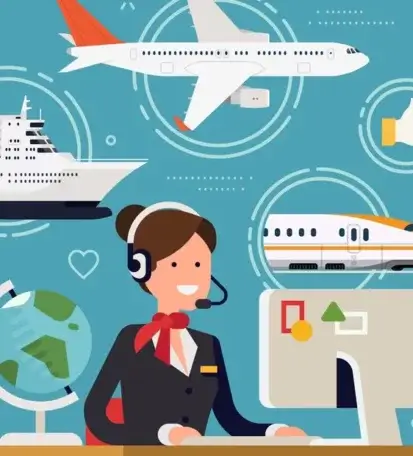Business Travel Guide
Travel Requirement for Production Managers: [Checklist + Guide]

Travel requirement for production managers can vary depending on the industry and specific job duties. Production managers are responsible for overseeing the manufacturing process of goods, ensuring that they are made efficiently and meet quality standards.
This often involves traveling to different locations to oversee production and coordinate with suppliers and clients. As such, travel is a necessary part of the job for many production managers.
Some production managers may need to travel frequently to oversee production at different plants or factories, while others may only need to travel occasionally for meetings or to visit suppliers. Regardless, production managers need to be prepared for travel and understand the logistics and considerations involved.
Travel is an important aspect of the job for many production managers, and proper preparation and management can help ensure success.
Key Takeaways
- Production managers often need to travel to oversee production and coordinate with suppliers and clients.
- Pre-travel preparation is crucial for production managers to ensure that their travel is smooth and efficient.
- Health and safety considerations should be taken into account when planning travel for production managers.
Understanding the Role of a Production Manager
Production managers are responsible for overseeing the manufacturing process and ensuring that products are produced efficiently and meet quality standards.
They are also responsible for managing production teams, coordinating with other departments, and implementing production plans.
Production managers may need to travel to different locations to oversee production processes or to meet with clients or suppliers.
They may also need to travel to attend conferences or training sessions to stay up-to-date on industry trends and best practices.
Key Travel Requirement for Production Managers
Production managers may need to travel domestically or internationally depending on the needs of their organization. Some key travel needs for production management include:
- Site Visits: Production managers may need to travel to different production sites to oversee production processes, troubleshoot issues, and ensure that quality standards are met. This may involve traveling to different cities or even different countries.
- Client Meetings: Production managers may need to travel to meet with clients to discuss production needs, provide updates on production progress, and address any concerns or issues.
- Supplier Visits: Production managers may need to travel to visit suppliers to ensure that materials are being sourced and delivered on time and to address any issues or concerns.
- Conferences and Training Sessions: Production managers may need to travel to attend conferences and training sessions to stay up-to-date on industry trends and best practices. This may involve traveling domestically or internationally.
To be successful in this role, production managers must be willing and able to travel as needed to ensure that production processes are running smoothly and that products are meeting quality standards.
Pre-Travel Preparation for Production Managers
Travel Documentation
Before embarking on any international travel, production managers must ensure that all necessary documentation is in order. This includes
- Passports,
- Visas, and
- Work permits.
It is recommended that production managers start the visa application process at least three months before the scheduled travel date.
Failure to secure the necessary travel documents may result in delayed travel or even cancellation of the production.
Budgeting for Travel
Travel expenses can add up quickly, especially when traveling internationally. Production managers must create a budget that takes into account all travel-related expenses, including:
- airfare,
- lodging,
- transportation, and
- meals.
It is important to factor in any local taxes, fees, and currency exchange rates when creating the budget.
Production managers should also consider purchasing travel insurance to protect against unforeseen circumstances that may affect the production.
Cultural Awareness and Training
Production managers should be aware of the cultural norms and customs of the destination country. This includes understanding the local language, dress code, and business etiquette.
It is also important to be aware of any cultural sensitivities that may affect the production, such as religious holidays or political events.
Production managers should provide training to the production crew to ensure that everyone is aware of the cultural differences and can avoid any unintentional offense.
Logistics Management for Production Managers
1. Transportation Arrangements
Transportation arrangements are a critical part of logistics management for production managers.
Production managers must ensure that the cast, crew, and equipment are transported safely and efficiently to the filming location.
This involves coordinating with transportation companies to arrange for the appropriate vehicles, such as buses or vans, to transport the cast, crew, and equipment to the filming location.
Production managers must also ensure that the transportation is on time and that any necessary permits or licenses are obtained.
2. Accommodation Booking
Production managers must also arrange for accommodation for the cast and crew. This involves booking hotel rooms or rental properties that are suitable for the needs of the cast and crew.
Production managers must ensure that the accommodation is located near the filming location and that it meets the required standards for comfort and safety.
They must also ensure that the accommodation is within the budget allocated for the production.
3. On-Site Transportation
On-site transportation is another critical aspect of logistics management for production managers.
This involves arranging for vehicles to transport the cast, crew, and equipment around the filming location. Production managers must ensure that the vehicles are safe and suitable for the terrain and weather conditions.
They must also ensure that the vehicles are available when needed and that any necessary permits or licenses are obtained.
Safety Considerations
Medical Precautions
Production managers need to take certain medical precautions before traveling for work. They should consult their healthcare provider to ensure that they are up-to-date on routine vaccinations, and any additional vaccinations that may be required for the destination country.
It is also important to carry a sufficient supply of any necessary prescription medications, as well as over-the-counter medications such as pain relievers, antacids, and anti-diarrheal drugs.
Safety Protocols
Production managers should be aware of the safety protocols in the destination country, and take necessary precautions to avoid any potential hazards. This includes researching the safety record of the hotel, transportation companies, and any other service providers they may use during their trip.
They should also be aware of any local laws and customs that may impact their safety, and take necessary precautions to avoid any potential conflicts.
Emergency Contacts
Production managers should have a plan in place for emergency situations. They should carry a list of emergency contacts, including the contact information for their employer, local emergency services, and the nearest embassy or consulate.
They should also be aware of the location of the nearest hospital or medical facility, and have a plan for accessing medical care if necessary.
In addition to these precautions, production managers should also consider purchasing travel insurance to protect themselves in case of unexpected events such as illness, injury, or trip cancellation.
Legal and Regulatory Compliance
Production managers must ensure that their travel plans and operations comply with relevant legal and regulatory requirements. Failure to comply with these requirements can result in legal and financial consequences, as well as damage to the reputation of the company. This section will discuss some of the key legal and regulatory compliance issues that production managers should be aware of.
Understanding International Laws
Production managers must be aware of the laws and regulations of the countries they are traveling to. These laws may include visa requirements, customs regulations, and local laws and regulations related to the production of goods or services. For example, some countries may have restrictions on the import or export of certain goods, or may require permits or licenses for certain activities.
Compliance with Export Controls
Production managers must also comply with export control laws and regulations. These laws are designed to prevent the proliferation of weapons of mass destruction and other sensitive technologies. Production managers must ensure that they do not export any goods or technologies that are subject to export control laws without the necessary licenses or authorizations.
Data Protection and Privacy
Production managers must also ensure that they comply with data protection and privacy laws. These laws are designed to protect the personal information of individuals and may include requirements related to data collection, storage, and transfer. Production managers must ensure that they have appropriate data protection and privacy policies in place, and that they comply with these policies when collecting, storing, and transferring personal information.
In summary, production managers must ensure that they comply with relevant legal and regulatory requirements when traveling for business purposes. This includes understanding international laws, complying with export controls, and ensuring compliance with data protection and privacy laws. By doing so, production managers can avoid legal and financial consequences and protect the reputation of their company.
Communication and Collaboration
Effective Remote Communication
In today’s globalized world, production managers often need to communicate with their team members who are located in different parts of the world. Effective remote communication is essential for ensuring that everyone is on the same page and that the project is progressing smoothly.
To achieve effective remote communication, production managers should prioritize clear and concise communication. They should use tools such as video conferencing, instant messaging, and email to keep in touch with their team members. It is also important to establish clear guidelines for communication, such as response times and preferred communication channels.
Collaborating Across Time Zones
Collaborating across time zones can be challenging, but it is essential for the success of a project. Production managers should be aware of the time differences between team members and should schedule meetings and deadlines accordingly. They should also establish clear guidelines for working across time zones, such as setting specific times for communication and establishing protocols for urgent situations.
To facilitate collaboration across time zones, production managers should consider using tools such as project management software and shared calendars. These tools can help team members stay organized and ensure that everyone is aware of deadlines and milestones.
Tools and Technology
Technology has made communication and collaboration easier than ever before. Production managers should take advantage of the latest tools and technology to facilitate effective communication and collaboration. This includes tools such as video conferencing software, project management software, and instant messaging platforms.
It is important to choose tools that are easy to use and that integrate well with existing systems. Production managers should also ensure that team members are trained on how to use these tools effectively.
In conclusion, effective communication and collaboration are essential for the success of any production project. Production managers should prioritize clear communication, establish guidelines for working across time zones, and take advantage of the latest tools and technology to facilitate collaboration.
Post-Travel Review and Reporting
After a production manager returns from a business trip, it is essential to review and report on the trip’s effectiveness. This section will cover the three main components of post-travel review and reporting: expense reconciliation, performance analysis, and feedback and improvements.
Expense Reconciliation
Expense reconciliation is the process of reviewing and reconciling all expenses incurred during the business trip. This process includes collecting and organizing receipts, verifying the accuracy of expenses, and ensuring that all expenses are within the company’s travel policy.
To make the expense reconciliation process more efficient, production managers can use expense management software or apps that automate the process. These tools can help to reduce errors, save time, and provide real-time expense tracking.
Performance Analysis
Performance analysis involves reviewing the results of the business trip and determining whether the trip met its objectives. This process includes analyzing the impact of the trip on the production process, identifying areas for improvement, and determining the return on investment (ROI) of the trip.
To conduct performance analysis effectively, production managers should use a combination of quantitative and qualitative data. Quantitative data can include metrics such as production output, while qualitative data can include employee feedback or customer satisfaction ratings.
Feedback and Improvements
Feedback and improvements involve collecting feedback from employees, customers, and other stakeholders about the business trip and using that feedback to make improvements for future trips. This process includes identifying areas for improvement, developing action plans, and implementing those plans.
To collect feedback effectively, production managers can use surveys, interviews, or focus groups. They can also use social media or other online platforms to gather feedback from a wider audience.
In conclusion, post-travel review and reporting is an essential component of effective travel management for production managers. By reconciling expenses, analyzing performance, and collecting feedback, production managers can optimize their travel programs and improve the ROI of their business trips.
Frequently Asked Questions
What are the typical travel expectations for a production manager in manufacturing?
The travel expectations for a production manager in manufacturing can vary depending on the company and the specific role. Some production managers may be required to travel frequently to oversee production processes at different locations, while others may primarily work on-site at a single facility. It is important for production managers to be flexible and willing to travel as needed to ensure that production goals are met.
How often do production managers in the film industry need to be on set?
Production managers in the film industry typically need to be on set whenever filming is taking place. This can involve long hours and frequent travel, as film productions may take place in various locations. Production managers must be able to adapt to changing schedules and work closely with the director and other members of the production team to ensure that everything runs smoothly.
Are there specific travel certifications required for production managers in the tech sector?
There are no specific travel certifications required for production managers in the tech sector. However, it is important for production managers to have strong organizational and communication skills, as well as the ability to adapt to changing schedules and travel requirements.
What percentage of time do production managers in the construction industry spend at project sites?
The percentage of time that production managers in the construction industry spend at project sites can vary depending on the specific role and the stage of the project. During the planning and design phase, production managers may spend more time in the office, while during the construction phase they may spend more time on-site. It is important for production managers to be able to balance their time between office work and on-site supervision to ensure that projects are completed on time and within budget.
Do international regulations affect the travel frequency of production managers in pharmaceuticals?
International regulations can affect the travel frequency of production managers in pharmaceuticals, as different countries may have different regulations and requirements for the production and distribution of pharmaceutical products. Production managers must be knowledgeable about these regulations and be able to travel as needed to ensure compliance.
Can production managers in the event planning industry work remotely, or is on-site presence mandatory?
The ability to work remotely can vary depending on the specific role and the company in the event planning industry. While some tasks, such as planning and coordination, can be done remotely, on-site presence is often necessary for events themselves. Production managers must be able to balance their time between remote work and on-site supervision to ensure that events are successful.




